Charles E W Bean, Diaries, AWM38 3DRL 606/243B/1 - 1916 - 1926 - Part 6
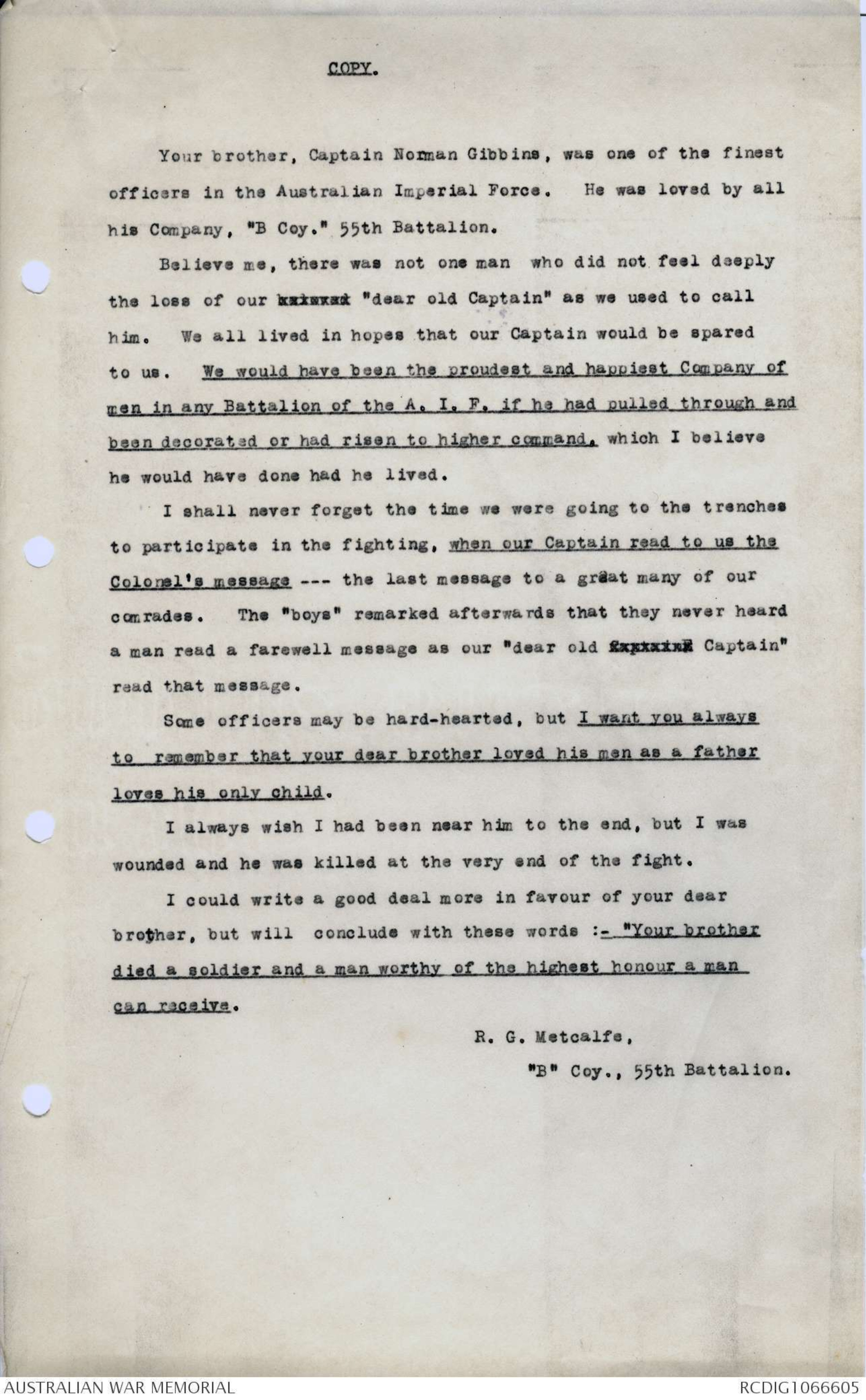

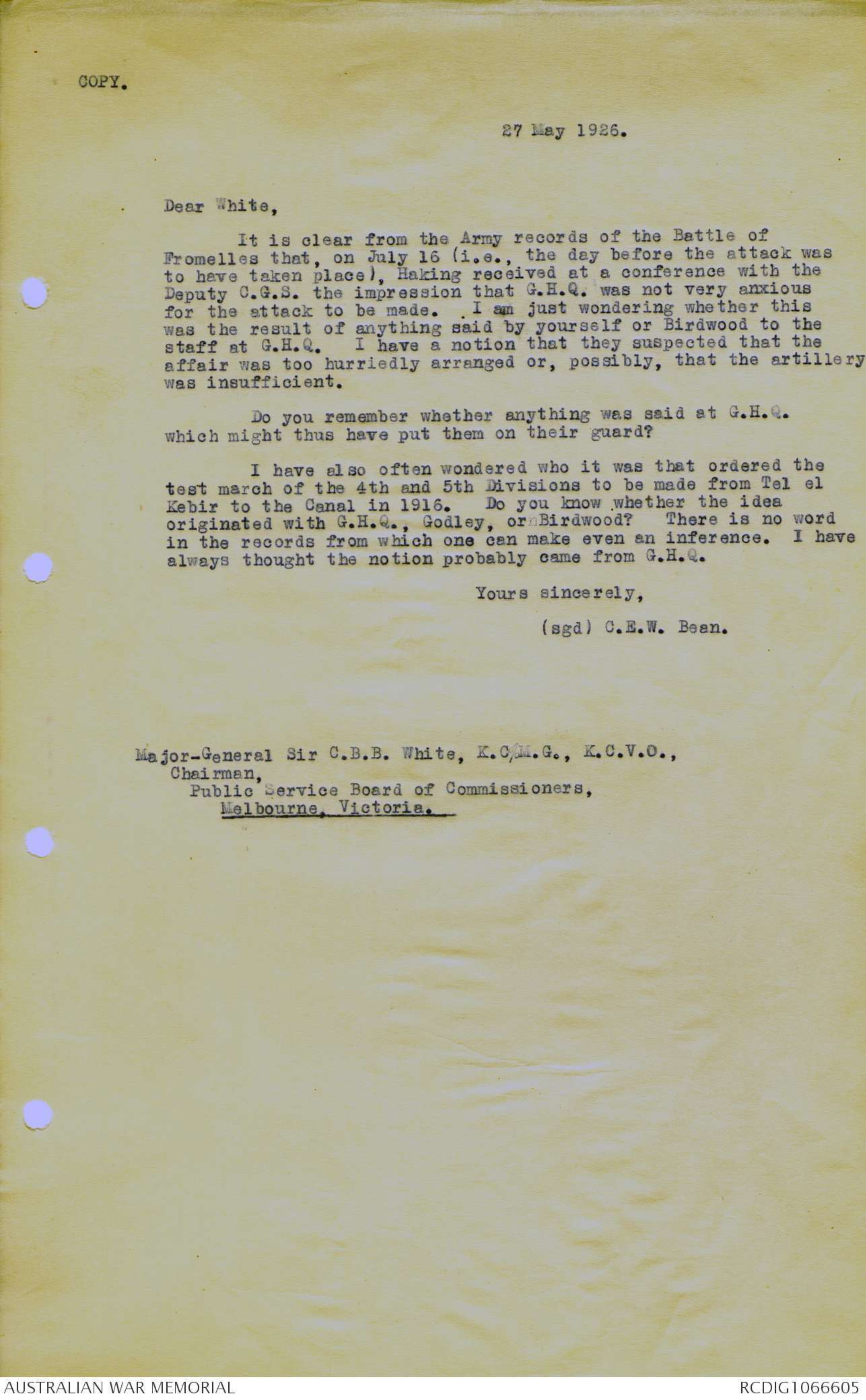
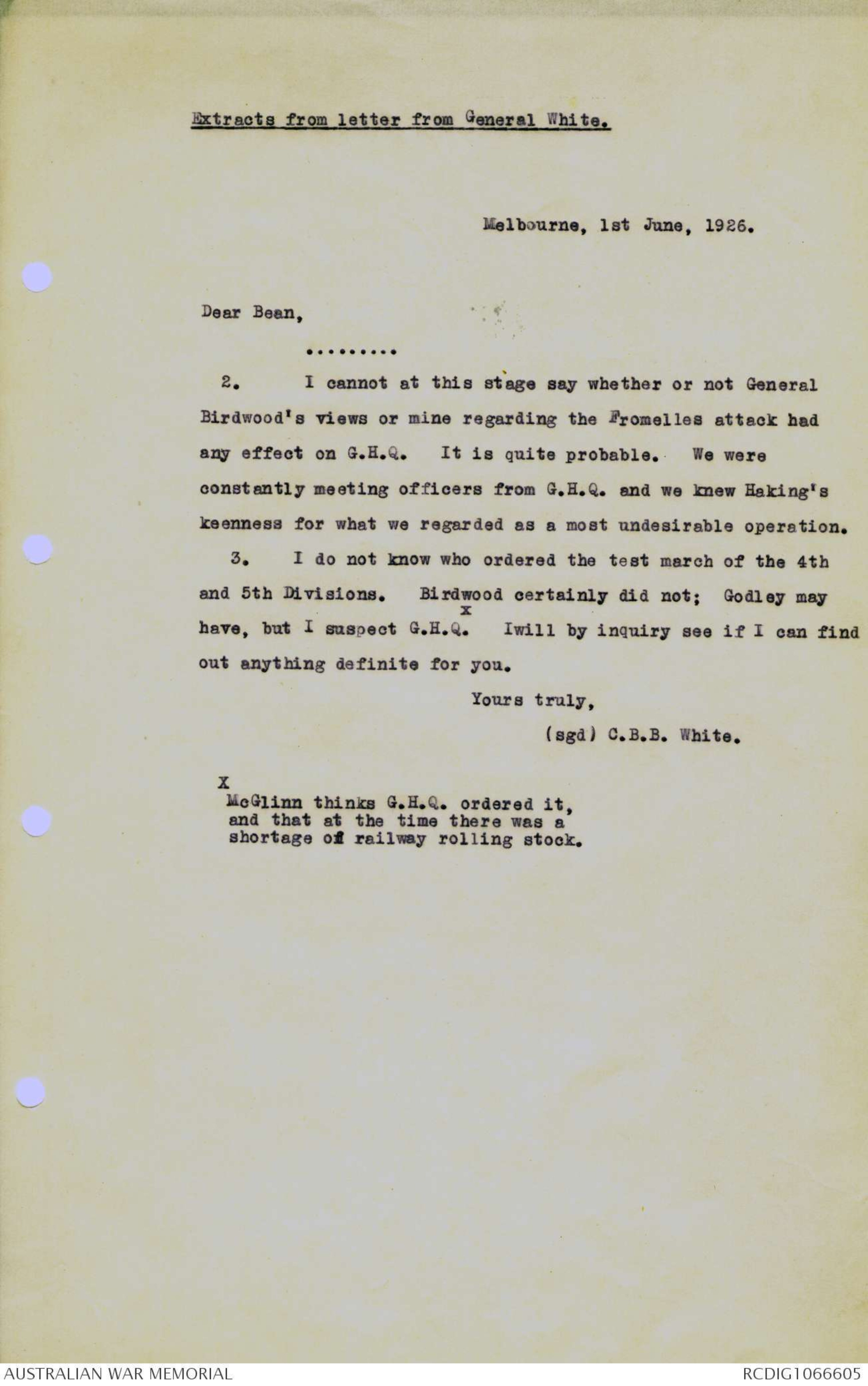
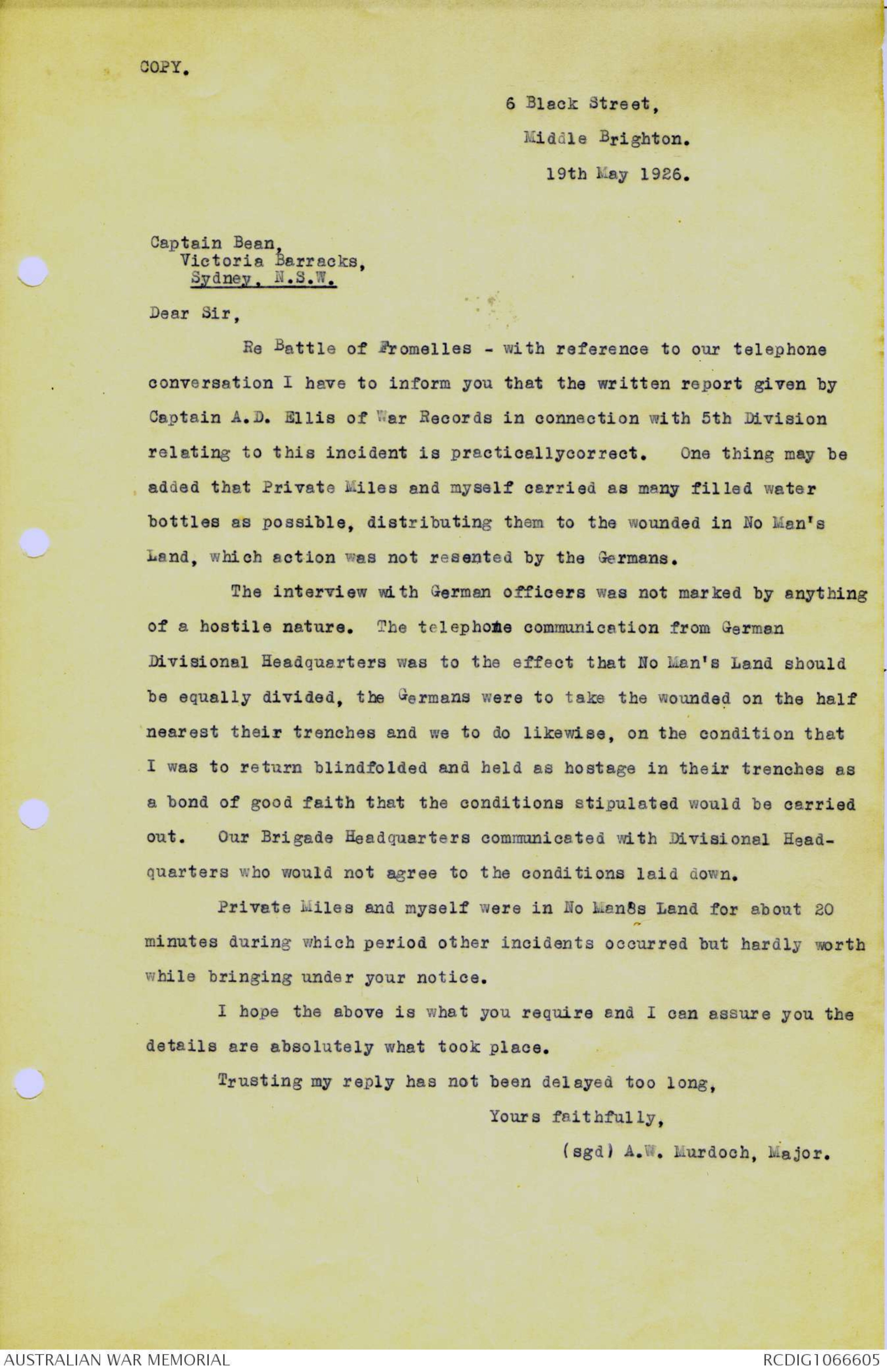
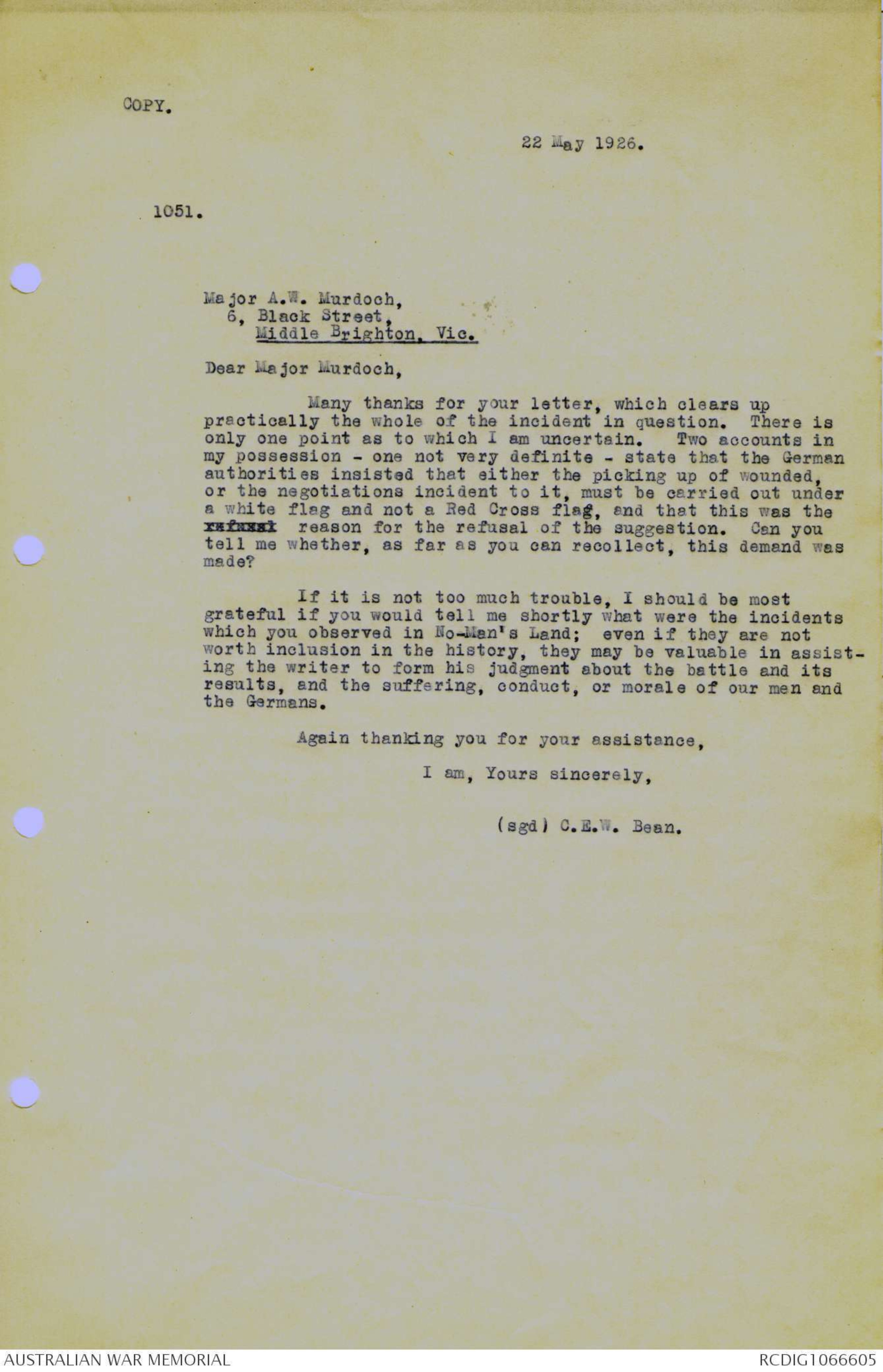
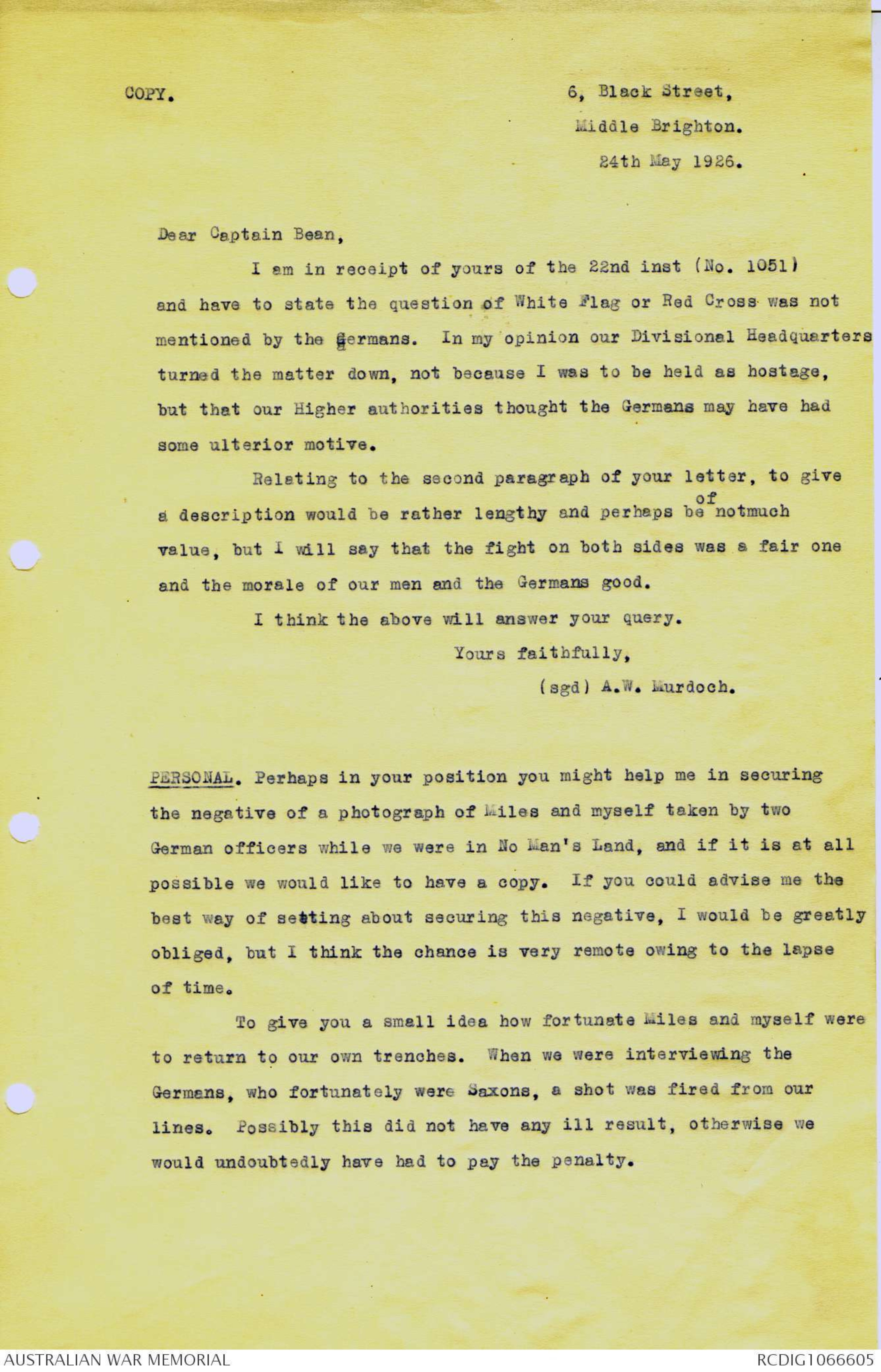
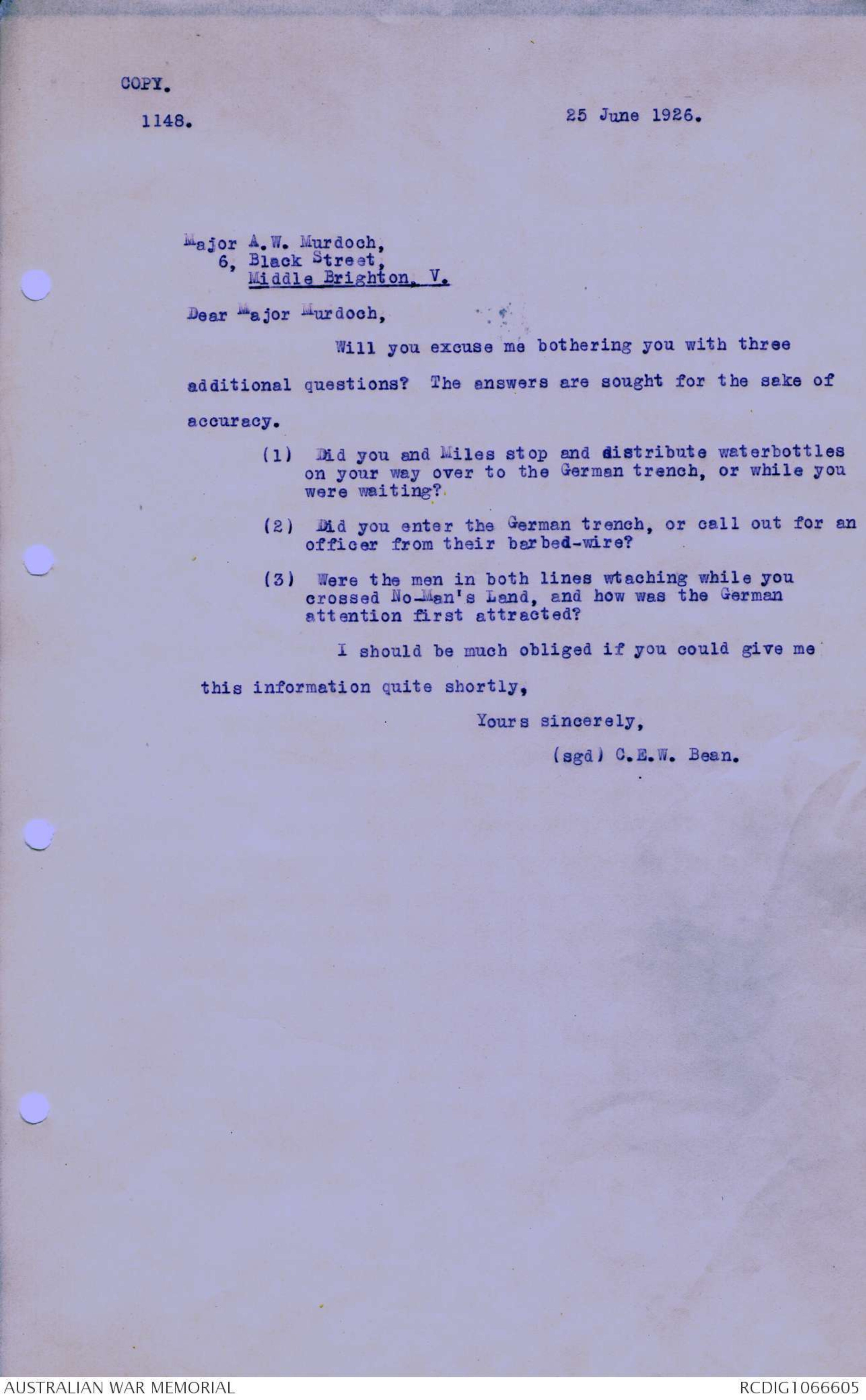
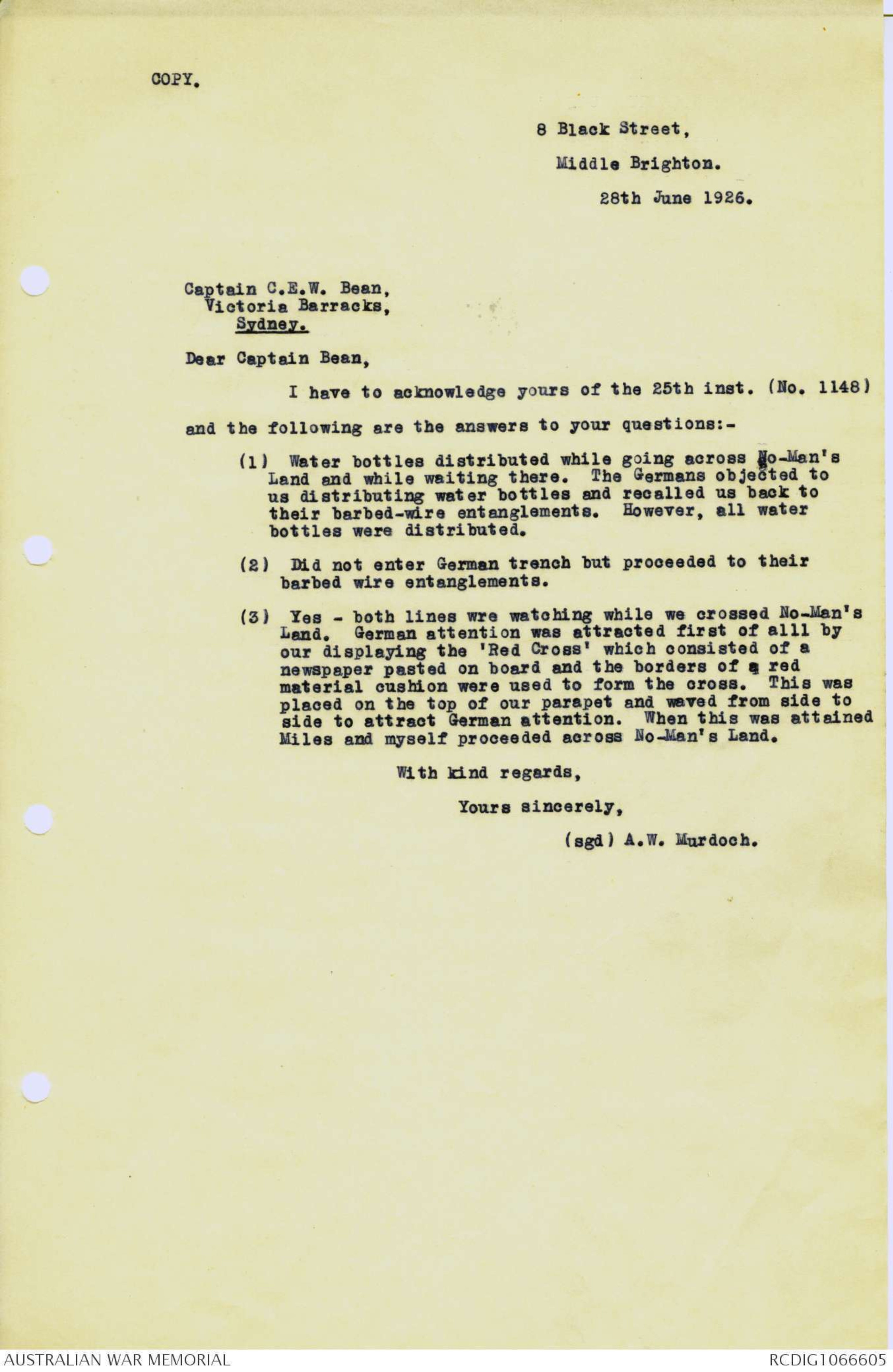
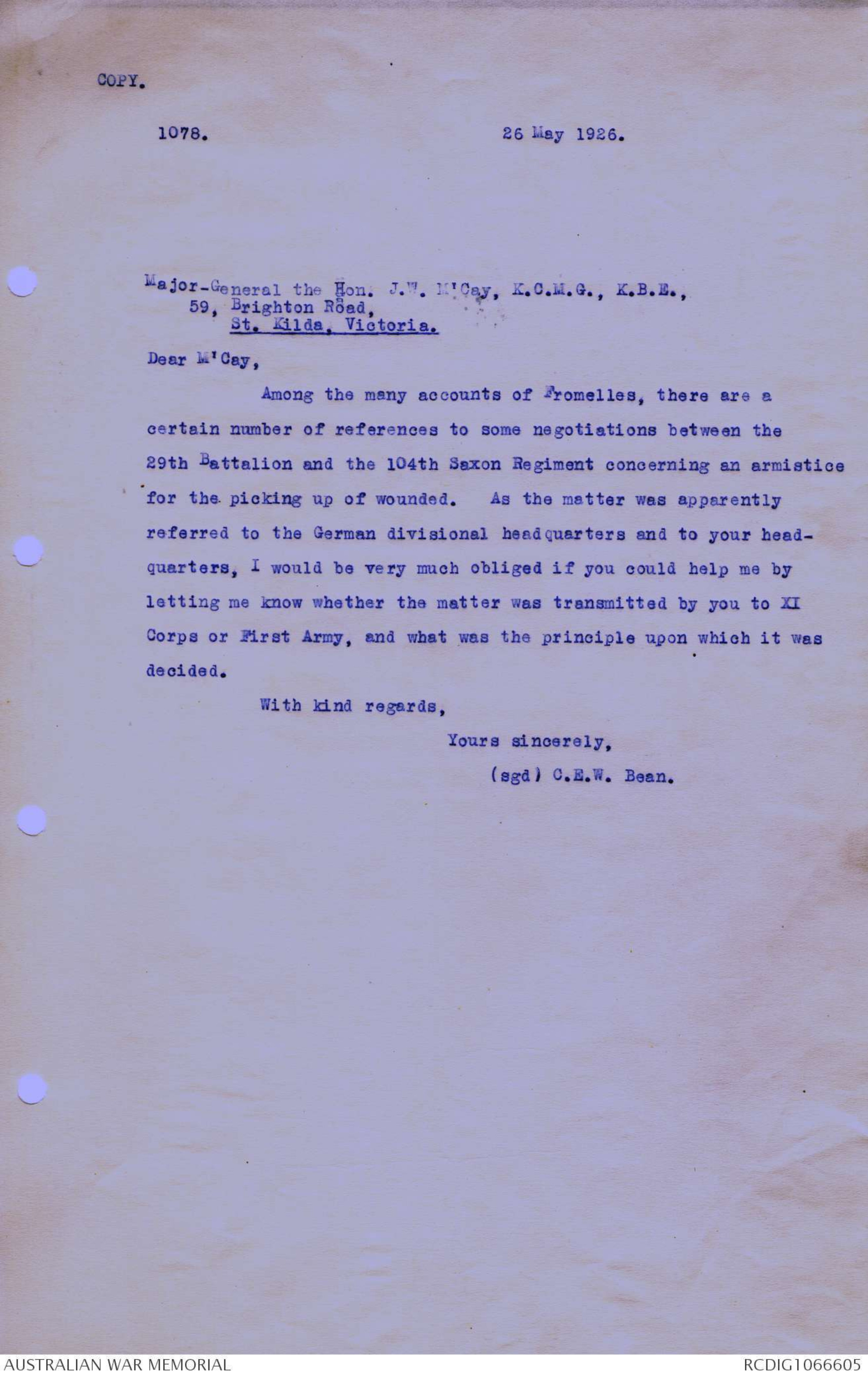
COPY.
Your brother, Captain Norman Gibbins, was one of the finest
officers in the Australian Imperial Force. He was loved by all
his Company, "B Coy." 55th Battalion.
Believe me, there was not one man who did not feel deeply
the loss of our beloved "dear old Captain" as we used to call
him. We all lived in hopes that our Captain would be spared
to us. We would have been the proudest and happiest Company of
men in any Battalion of the A. I. F. if he had pulled through and
been decorated or had risen to higher command, which I believe
he would have done had he lived.
I shall never forget the time we were going to the trenches
to participate in the fighting, when our Captain read to us the
Colonel's message ––- the last message to a great many of our
comrades. The "boys" remarked afterwards that they never heard
a man read a farewell message as our "dear old xxxxxxxx Captain"
read that message.
Some officers may be hard-hearted, but I want you always
to remember that your dear brother loved his men as a father
loves his only child.
I always wish I had been near him to the end, but I was
wounded and he was killed at the very end of the fight.
I could write a good deal more in favour of your dear
brother, but will conclude with these words :- "Your brother
died a soldier and a man worthy of the highest honour a man.
can receive.
R. G. Metcalfe,
"B" Coy., 55th Battalion.
AUSTRALIAN WAR MEMORIAL RCDIG1066605
COPY.
(This letter was found upon Private Henry E. Williams, 15th
Brigade, wounded at Fromelles by shrapnel and died about 1
month later at Chelmsford, Eng. It is to his mother at
Palmer Street, Collingwood, Vic.)
July 17th 1916.
Dear Mother,
The time is near at hand for a great offensive
and, should I fall, I will be proud to know I did so in the
cause of Righteousness and Justice; a death which is honour
both in the sight of God and mankind.
This is a great blow to you, but cheer up for I am
sure it is only for a short time till we meet again in the new
land.
Owen! give every assistance to Mother as a last
request. Give my best brotherly wishes to Florrie and Bida.
Dad! I have kept your wishes; neither smoked nor taken liquor.
Give my regards to all the boys and girls.
So good-bye for a short time.
I remain,
Your faithful son,
Henry.
God bless you till you we meet again.
COPY.
27 May 1926.
Dear White,
It is clear from the Army records of the Battle of
Fromelles that, on July 16 (i.e., the day before the attack was
to have taken place), Haking received at a conference with the
Deputy C.G.S. the impression that G.H.Q. was not very anxious
for the attack to be made. I am just wondering whether this
was the result of anything said by yourself or Birdwood to the
staff at G.H.Q. I have a notion that they suspected that the
affair was too hurriedly arranged or, possibly, that the artillery
was insufficient.
Do you remember whether anything was said at G.H.Q.
which might thus have put them on their guard?
I have also often wondered who it was that ordered the
test march of the 4th and 5th Divisions to be made from Tel el
Kebir to the Canal in 1916. Do you know whether the idea
originated with G.H.Q., Godley, or Birdwood? There is no word
in the records from which one can make even an inference. I have
always thought the notion probably came from G.H.Q.
Yours sincerely,
(sgd) C.E.W. Bean.
Major-General Sir C.B.B. White, K.C.M.G., K.C.V.O.,
Chairman,
Public Service Board of Commissioners,
Melbourne, Victoria.
AUSTRALIAN WAR MEMORIAL RCDIG1066605
Extracts from letter from General White.
Melbourne, 1st June, 1926.
Dear Bean,
.................
2. I cannot at this stage say whether or not General
Birdwood's views or mine regarding the Fromelles attack had
any effect on G.H.Q. It is quite probable. We were
constantly meeting officers from G.H.Q. and we knew Haking's
keenness for what we regarded as a most undesirable operation.
3. I do not know who ordered the test march of the 4th
and 5th Divisions. Birdwood certainly did not; Godley may
have, but I suspect G.H.Q. Iwill by inquiry see if I can find
out anything definite for you.
Yours truly,
(sgd) C.B.B. White.
X McGlinn thinks G.H.Q. ordered it
and that at the time there was a
shortage of railway rolling stock.
AUSTRALIAN WAR MEMORIAL RCDIG1066605
COPY.
6 Black Street,
Middle Brighton.
19th May 1926.
Captain Bean
Victoria Barracks,
Sydney, N.S.W.
Dear Sir,
Re Battle of Fromelles - with reference to our telephone
conversation I have to inform you that the written report given by
Captain A.D. Ellis of War Records in connection with 5th Division
relating to this incident is practicallycorrect. One thing may be
added that Private Miles and myself carried as many filled water
bottles as possible, distributing them to the wounded in No Man's
Land, which action was not resented by the Germans.
The interview with German officers was not marked by anything
of a hostile nature. The telephone communication from German
Divisional Headquarters was to the effect that No Man's Land should
be equally divided, the Germans were to take the wounded on the half
nearest their trenches and we to do likewise, on the condition that
I was to return blindfolded and held as hostage in their trenches as
a bond of good faith that the conditions stipulated would be carried
out. Our Brigade Headquarters communicated with Divisional Headquarters
who would not agree to the conditions laid down.
Private Miles and myself were in No Man's Land for about 20
minutes during which period other incidents occurred but hardly worth
while bringing under your notice.
I hope the above is what you require and I can assure you the
details are absolutely what took place.
Trusting my reply has not been delayed too long,
Yours faithfully,
(sgd) A.W. Murdoch, Major.
AUSTRALIAN WAR MEMORIAL RCDIG1066605
COPY.
22 May 1926.
1051.
Major A.W. Murdoch,
6, Black Street,
Middle Brighton, Vic.
Dear Major Murdoch,
Many thanks for your letter, which clears up
practically the whole of the incident in question. There is
only one point as to which I am uncertain. Two accounts in
my possession - one not very definite - state that the German
authorities insisted that either the picking up of wounded,
or the negotiations incident to it, must be carried out under
a white flag and not a Red Cross flag, and that this was therefusal reason for the refusal of the suggestion. Can you
tell me whether, as far as you can recollect, this demand was
made?
If it is not too much trouble, I should be most
grateful if you would tell me shortly what were the incidents
which you observed in No-Man's Land; even if they are not
worth inclusion in the history, they may be valuable in assisting
the writer to form his judgment about the battle and its
results, and the suffering, conduct, or morale of our men and
the Germans.
Again thanking you for your assistance,
I am, Yours sincerely,
(sgd) C.E.W. Bean.
AUSTRALIAN WAE MEMORIAL RCDIG1066605
COPY.
6, Black Street,
Middle Brighton.
24th May 1926.
Dear Captain Bean,
I am in receipt of yours of the 22nd inst (No. 1051)
and have to state the question of White Flag or Red Cross was not
mentioned by the Germans. In my opinion our Divisional Headquarters
turned the matter down, not because I was to be held as hostage,
but that our Higher authorities thought the Germans may have had
some ulterior motive.
Relating to the second paragraph of your letter, to give
a description would be rather lengthy and perhaps be ^of notmuch
value, but I will say that the fight on both sides was a fair one
and the morale of our men and the Germans good.
I think the above will answer your query.
Yours faithfully,
(sgd) A.W. Murdoch.
PERSONAL. Perhaps in your position you might help me in securing
the negative of a photograph of Miles and myself taken by two
German officers while we were in No Man's Land, and if it is at all
possible we would like to have a copy. If you could advise me the
best way of setting about securing this negative, I would be greatly
obliged, but I think the chance is very remote owing to the lapse
of time.
To give you a small idea how fortunate Miles and myself were
to return to our own trenches. When we were interviewing the
Germans, who fortunately were Saxons, a shot was fired from our
lines. Possibly this did not have any ill result, otherwise we
would undoubtedly have had to pay the penalty.
AUSTRALIAN WAR MEMORIAL RCDIG1066605
COPY.
1148.
25 June 1926.
Major A.W. Murdoch,
6, Black Street,
Middle Brighton. V.
Dear Major Murdoch,
Will you excuse me bothering you with three
additional questions? The answers are sought for the sake of
accuracy.
(1) Did you and Miles stop and distribute waterbottles
on your way over to the German trench, or while you
were waiting?
(2) Did you enter the German trench, or call out for an
officer from their barbed-wire?
(3) Were the men in both lines wtaching while you
crossed No-Man's Land, and how was the German
attention first attracted?
I should be much obliged if you could give me
this information quite shortly,
Yours sincerely,
(sgd) C.E.W. Bean.
AUSTRALIAN WAR MEMORIAL RCDIG1066605
COPY.
8 Black Street,
Middle Brighton.
28th June 1926.
Captain C.E.W. Bean,
Victoria Barracks,
Sydney.
Dear Captain Bean,
I have to acknowledge yours of the 25th inst. (No. 1148)
and the following are the answers to your questions:-
(1) Water bottles distributed while going across No-Man's
Land and while waiting there. The Germans objected to
us distributing water bottles and recalled us back to
their barbed-wire entanglements. However, all water
bottles were distributed.
(2) Did not enter German trench but proceeded to their
barbed wire entanglements.
(3) Yes - both lines wre watching while we crossed No-Man's
Land. German attention was attracted first of alll by
our displaying the 'Red Cross' which consisted of a
newspaper pasted on board and the borders of a red
material cushion were used to form the cross. This was
placed on the top of our parapet and waved from side to
side to attract German attention. When this was attained
Miles and myself proceeded across No-Man's Land.
With kind regards,
Yours sincerely,
(sgd) A.W. Murdoch.
AUSTRALIAN WAR MEMORIAL RCDIG1066605
COPY.
1078. 26 May 1926.
Major-General the Hon. J.W. M'Cay, K.C.M.G., K.B.E.,
59, Brighton Road,
St. Kilda, Victoria.
Dear M'Cay,
Among the many accounts of Fromelles, there are a
certain number of references to some negotiations between the
29th Battalion and the 104th Saxon Regiment concerning an armistice
for the picking up of wounded. As the matter was apparently
referred to the German divisional headquarters and to your headquarters,
I would be very much obliged if you could help me by
letting me know whether the matter was transmitted by you to XI
Corps or First Army, and what was the principle upon which it was
decided.
With kind regards,
Yours sincerely,
(sgd) C.E.W. Bean.
AUSTRALIAN WAR MEMORIAL RCDIG1066605
 Deb Parkinson
Deb ParkinsonThis transcription item is now locked to you for editing. To release the lock either Save your changes or Cancel.
This lock will be automatically released after 60 minutes of inactivity.